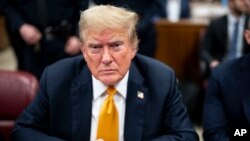The 12-member New York jury deciding the fate of former U.S. President Donald Trump in his hush money trial now has a basic choice to make: Is he guilty or innocent?
But under U.S law, it is not quite that simple.
Defendants can only be found guilty if a jury unanimously deems the evidence presented by the prosecution is sufficient beyond a reasonable doubt.
If the jurors unanimously decide there is reasonable doubt that the defendant committed the crime he is charged with, the jury must acquit the defendant.
Trump is accused of telling his one-time political fixer, Michael Cohen, to pay $130,000 in hush money days ahead of the 2016 election to adult-film actress Stormy Daniels to silence her claim she had a one-night sexual encounter with Trump a decade earlier. Trump denies the allegation.
A hush money deal is not illegal, but Trump is charged in a 34-count indictment of falsifying his company business records to hide the 2017 reimbursement of the hush money payment to Cohen, which Trump claimed was for money owed to Cohen for his legal work. The Trump defense claimed Cohen, on his own volition and without Trump’s knowledge, wired the hush money to Daniels’ lawyer.
Trump has denied all the criminal charges.
Like in all criminal cases, the New York jury could convict Trump on some, all or none of the charges he faces.
The burden is solely on prosecutors to prove someone guilty. Defense lawyers do not have to prove the defendant is innocent and defendants have the option to testify on their own behalf.
Jurors sometimes split among themselves as they consider evidence against a defendant, with some favoring a guilty verdict while others call for an acquittal. Or maybe, the jurors say they have reached a verdict on some charges but not others.
When that happens, juries often inform the judge they are deadlocked in their deliberations on some or all the charges. Then, judges might declare a mistrial on the undecided charges facing a defendant or give the jurors a “charge,” telling them to reconsider their thinking about the case and listen closely to the arguments and opinions of the other jurors.
If ultimately, the jurors say they are hopelessly deadlocked with no possibility of reaching a unanimous verdict, judges most likely will declare a mistrial, leaving it up to prosecutors to decide whether to retry the case.
Sometimes, a new trial is held, but other times, prosecutors drop the charges against defendants and the case ends.




